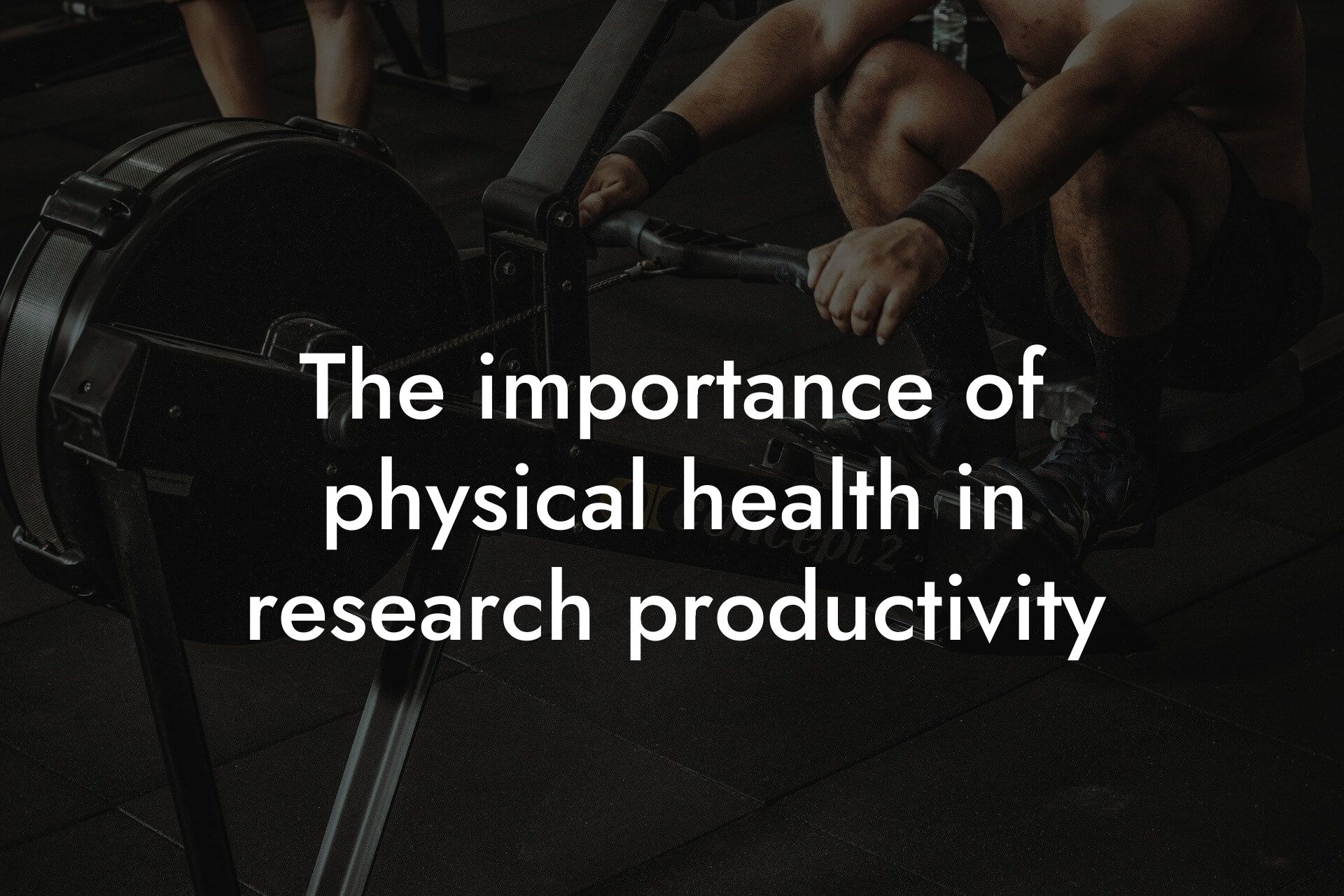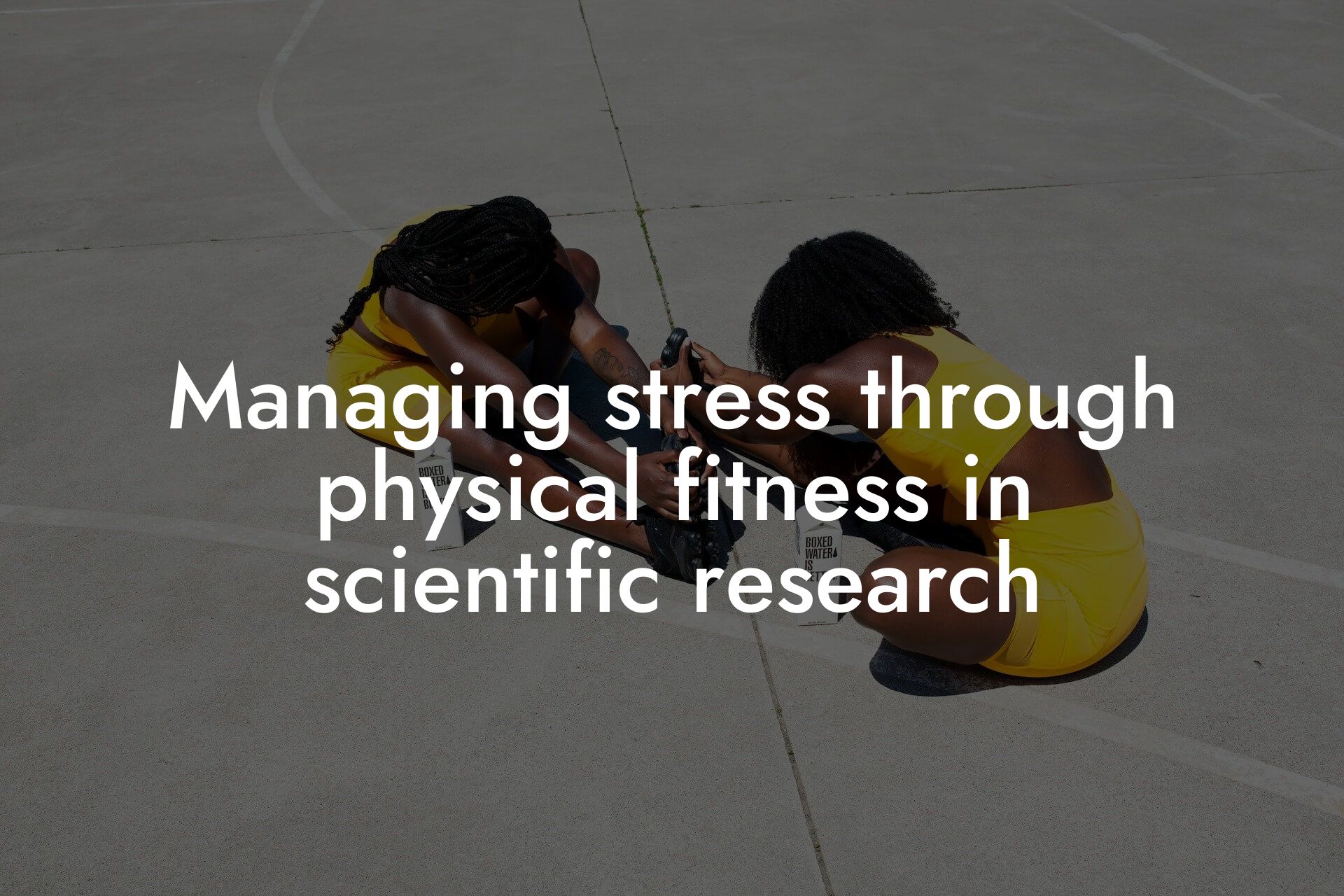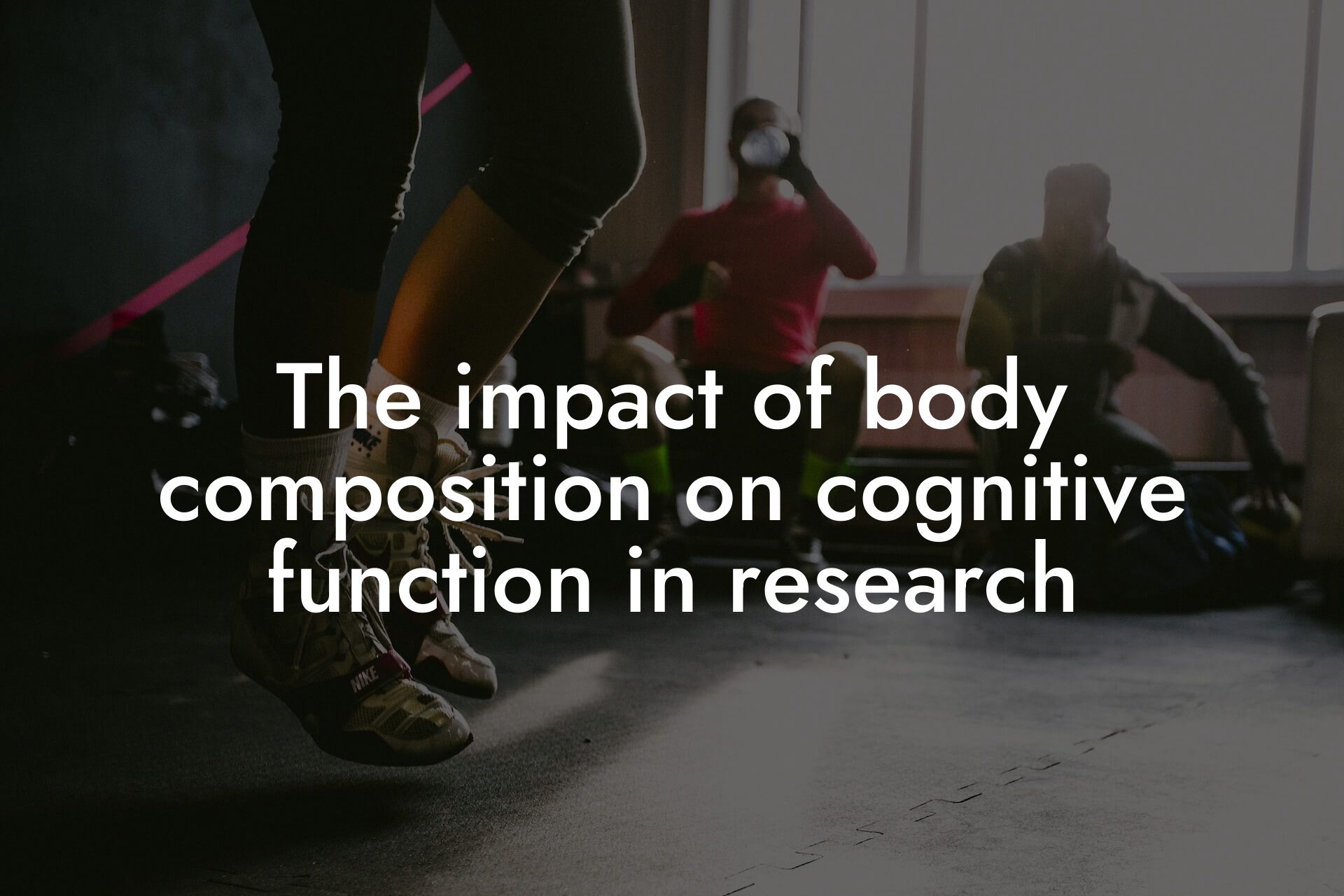As a researcher, you're no stranger to long hours spent in the lab, pouring over data, conducting experiments, and analyzing results. While your work is crucial to advancing scientific knowledge, it can take a toll on your physical health. Prolonged periods of sitting, lack of physical activity, and poor eating habits can lead to weight gain, decreased energy levels, and a decline in overall fitness. However, it's not impossible to maintain your physical fitness despite the demands of your job. In this article, we'll provide you with practical tips and strategies to help you stay fit and healthy during long lab hours.
Table of Contents
Understand the Challenges of Lab Work
Lab work can be physically and mentally demanding, often requiring long hours of concentration, precision, and attention to detail. The sedentary nature of lab work, combined with the pressure to meet deadlines and publish research, can lead to a range of health problems, including obesity, diabetes, and cardiovascular disease. Furthermore, the lab environment can be isolating, making it difficult to prioritize physical activity and healthy eating.
Start with Small Changes
Don't try to overhaul your entire lifestyle at once. Start with small, achievable changes that can be incorporated into your daily routine. For example, try taking a 10-minute walk during your lunch break, or doing a few jumping jacks during commercial breaks while watching TV. These small changes can add up over time and make a significant impact on your overall fitness.
Make the Most of Your Commute
If you take public transportation to work, get off a stop earlier and walk the rest of the way. If you drive, park your car in a spot that's further away from the lab entrance. These small changes can add up to an extra 30 minutes of physical activity per day.
Take Breaks to Move
Take regular breaks throughout the day to stretch, move around, and get your blood flowing. Try doing a few desk exercises, like shoulder rolls, wrist extensions, and toe taps. You can also do a few jumping jacks, push-ups, or squats during your breaks.
Stay Hydrated and Fueled
It's easy to get caught up in your work and forget to drink water or eat healthy snacks. Keep a water bottle at your desk and refill it regularly throughout the day. Avoid sugary snacks and opt for healthy options like nuts, fruits, and veggies instead.
Incorporate Strength Training
Strength training is essential for maintaining muscle mass and bone density. You don't need to join a gym or invest in expensive equipment to get started. Bodyweight exercises like push-ups, squats, and lunges can be done anywhere, anytime. You can also use resistance bands or light weights to add variety to your workouts.
Find a Workout Buddy
Having a workout buddy can be a great motivator and help you stay accountable. Find a colleague or friend who shares your fitness goals and schedule workout sessions together. You can also join a fitness class or gym near your lab to meet new people and stay motivated.
Use Technology to Your Advantage
There are many fitness apps and tools available that can help you track your progress, set goals, and stay motivated. Find an app that works for you and use it to track your workouts, monitor your progress, and set reminders to stay active.
Make Time for Self-Care
Self-care is essential for maintaining your physical and mental health. Make time for activities that bring you joy and relaxation, such as reading, meditation, or yoga. Prioritize sleep and aim for 7-8 hours of restful sleep per night to help your body recover from the physical demands of lab work.
Get a Professional Assessment
At Tano Performance Group, we understand the importance of maintaining physical fitness, especially for high-earning professionals like researchers. Our DEXA machine provides a comprehensive body assessment, giving you valuable insights into your body composition, bone density, and overall fitness. With this information, you can create a personalized fitness plan tailored to your specific needs and goals.
Frequently Asked Questions
What are the common challenges researchers face in maintaining fitness during long lab hours?
Researchers often face challenges such as sedentary work, limited time for exercise, and high levels of stress, which can negatively impact their physical and mental well-being. Additionally, the pressure to meet deadlines and the lack of autonomy over their schedules can make it difficult to prioritize fitness.
Why is it essential for researchers to maintain fitness during long lab hours?
Maintaining fitness is crucial for researchers as it can improve their overall health, increase energy levels, and enhance cognitive function. Regular exercise can also reduce the risk of chronic diseases, such as heart disease and diabetes, which are prevalent among sedentary workers.
What are some simple exercises that researchers can do at their desks?
Researchers can do simple exercises like chair squats, desk push-ups, and leg raises while sitting at their desks. They can also try wrist extensions, shoulder rolls, and neck stretches to reduce the risk of musculoskeletal disorders.
How can researchers incorporate physical activity into their daily commute?
Researchers can incorporate physical activity into their daily commute by walking, cycling, or taking public transportation instead of driving. They can also try taking the stairs instead of the elevator or doing a few jumping jacks during breaks.
What are some healthy snack options for researchers to maintain energy levels?
Researchers can maintain energy levels by snacking on healthy options like nuts, fruits, carrot sticks with hummus, and energy bars. They should avoid sugary drinks and snacks that can lead to energy crashes later.
How can researchers prioritize self-care during long lab hours?
Researchers can prioritize self-care by taking regular breaks, practicing mindfulness, and setting realistic goals. They can also try to disconnect from work-related tasks during breaks and focus on relaxation techniques like deep breathing or meditation.
What are some ways researchers can stay motivated to exercise during long lab hours?
Researchers can stay motivated to exercise by setting specific and achievable goals, finding an exercise buddy, and tracking their progress. They can also try to vary their exercise routine to avoid boredom and incorporate activities they enjoy, like dancing or swimming.
How can researchers balance their work and fitness goals?
Researchers can balance their work and fitness goals by prioritizing their tasks, setting realistic deadlines, and scheduling exercise sessions into their daily routine. They can also try to find ways to incorporate physical activity into their work, such as taking a walking meeting or using a standing desk.
What are some common myths about exercise and fitness that researchers should be aware of?
Researchers should be aware of common myths like "I'm too busy to exercise" or "I need to spend hours at the gym to see results." They should also be aware of the myth that exercise has to be intense to be effective, as even moderate physical activity can have significant health benefits.
How can researchers overcome the lack of motivation to exercise during long lab hours?
Researchers can overcome the lack of motivation to exercise by reminding themselves of their fitness goals, finding an exercise routine they enjoy, and celebrating small victories. They can also try to focus on the benefits of exercise, such as increased energy levels and improved mood, rather than the activity itself.
What are some ways researchers can track their fitness progress during long lab hours?
Researchers can track their fitness progress by using wearable devices, mobile apps, or fitness trackers. They can also try to set specific and measurable goals, like increasing their daily step count or reducing their body fat percentage.
How can researchers incorporate strength training into their exercise routine?
Researchers can incorporate strength training into their exercise routine by doing bodyweight exercises, like push-ups and squats, or using resistance bands. They can also try to incorporate high-intensity interval training (HIIT) to improve their overall fitness.
What are some benefits of incorporating mindfulness into a researcher's exercise routine?
Incorporating mindfulness into a researcher's exercise routine can improve their overall well-being, reduce stress, and increase their self-awareness. It can also help them develop a more positive body image and reduce the risk of exercise-related injuries.
How can researchers stay hydrated during long lab hours?
Researchers can stay hydrated by drinking plenty of water throughout the day, avoiding sugary drinks, and eating hydrating foods like watermelon and cucumbers. They can also try to limit their caffeine intake, as it can have dehydrating effects.
What are some ways researchers can prioritize sleep during long lab hours?
Researchers can prioritize sleep by establishing a consistent sleep schedule, creating a relaxing bedtime routine, and avoiding screens before bedtime. They can also try to create a sleep-conducive environment, like keeping their bedroom cool and dark.
How can researchers manage stress during long lab hours?
Researchers can manage stress by taking regular breaks, practicing relaxation techniques like deep breathing or meditation, and prioritizing self-care. They can also try to reframe their negative thoughts, focus on the present moment, and seek support from colleagues or mentors.
What are some common injuries that researchers may experience during exercise?
Researchers may experience common injuries like shin splints, plantar fasciitis, or lower back strain during exercise. They can prevent these injuries by warming up properly, cooling down, and incorporating stretching and strengthening exercises into their routine.
How can researchers modify their exercise routine during illness or injury?
Researchers can modify their exercise routine during illness or injury by taking rest days, reducing the intensity or frequency of their workouts, and incorporating low-impact activities like yoga or swimming. They should also consult with a healthcare professional before resuming exercise.
What are some ways researchers can make exercise a habit during long lab hours?
Researchers can make exercise a habit by scheduling it into their daily routine, finding an exercise buddy, and tracking their progress. They can also try to incorporate physical activity into their daily tasks, like taking the stairs instead of the elevator.
How can researchers stay accountable to their fitness goals during long lab hours?
Researchers can stay accountable to their fitness goals by sharing their goals with a friend or mentor, tracking their progress, and rewarding themselves for small victories. They can also try to find a workout buddy or join a fitness community for support.
What are some common mistakes researchers make when trying to maintain fitness during long lab hours?
Researchers may make common mistakes like not prioritizing self-care, not setting realistic goals, and not incorporating variety into their exercise routine. They may also neglect to track their progress, which can lead to demotivation and a lack of accountability.
How can researchers incorporate flexibility exercises into their routine?
Researchers can incorporate flexibility exercises into their routine by doing stretching exercises, like hamstring and quadriceps stretches, or incorporating activities like yoga or Pilates. They can also try to incorporate flexibility exercises into their daily tasks, like stretching while waiting for experiments to run.
What are some ways researchers can make healthy food choices during long lab hours?
Researchers can make healthy food choices by packing their own snacks and meals, avoiding vending machine foods, and incorporating nutrient-dense foods like fruits, vegetables, and whole grains into their diet. They can also try to limit their intake of sugary drinks and saturated fats.
Here are some related articles you might love...
- The importance of physical health in research productivity
- Managing stress through physical fitness in scientific research
- The impact of body composition on cognitive function in research
- Quick workouts for researchers during lab breaks
- Balancing lab work with personal fitness goals
- Nutrition strategies for maintaining focus during experiments
- The role of physical fitness in preventing research-related injuries
- How to stay active during sedentary research work
- How DEXA scans can benefit scientists and researchers
Zak Faulkner
Zak Faulkner is a leading authority in the realm of physical health and body composition analysis, with over 15 years of experience helping professionals optimise their fitness and well-being. As one the experts behind Tano Performance Group, Zak has dedicated his career to providing in-depth, science-backed insights that empower clients to elevate their physical performance and overall health.
With extensive knowledge of DEXA technology, Zak specializes in delivering comprehensive body assessments that offer precise data on body fat, muscle mass, bone density, and overall physique. His expertise enables individuals to make informed decisions and achieve their fitness goals with accuracy and confidence. Zak’s approach is rooted in a deep understanding of human physiology, combined with a passion for helping clients unlock their full potential through personalised strategies.
Over the years, Zak has earned a reputation for his commitment to excellence, precision, and client-focused service. His guidance is trusted by top professionals who demand the best when it comes to their health. Whether advising on fitness programs, nutritional strategies, or long-term wellness plans, Zak Faulkner’s insights are a valuable resource for anyone serious about taking their health and fitness to the next level.
At Tano Performance Group, Zak continues to lead our Content Team revolutionising how professionals approach their physical health, offering unparalleled expertise that drives real results.




